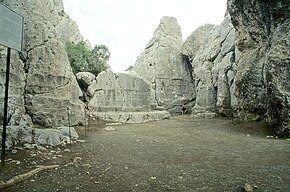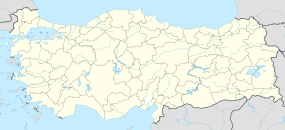Yazilikaya

Yazılıkaya
|
|
| Location | Çorum Province, Turkey |
|---|---|
| Region | Anatolia |
| Coordinates | 40°01′30″N 34°37′58″E / 40.02500°N 34.63278°ECoordinates: 40°01′30″N 34°37′58″E / 40.02500°N 34.63278°E |
| Type | Settlement |
| Site notes | |
| Condition | In ruins |
Yazılıkaya (Turkish; inscribed rock) was a sanctuary of Hattusa, the capital city of the Hittite Empire, today in the Çorum Province, Turkey.
This was a holy site for the Hittites, located within walking distance of the gates of the city of Hattusa. It had two main chambers formed inside a group of rock outcrops. Access to the roofless chambers were controlled by gateway and building structures built right in front of them, however only the foundations of those structures survived today. Most impressive today are the rock reliefs of Chambers A and B portraying the gods of the Hittite pantheon. One of the uses of the sanctuary may have involved the New Year's celebrations ceremonies. It was in use at least since late 16th century BCE, but most of the rock carvings date to the reign of the Hittite kings Tudhaliya IV and Suppiluliuma II in the late 13th century BCE, when the site underwent a significant restoration.
The most impressive is Chamber A, which contains rock-cut relief of 64 deities in procession. The left wall shows a procession of male deities, wearing the traditional kilts, pointed shoes and horned hats. Mountain gods are also shown with scaled skirts to symbolise the rocky mountains. The right wall shows a procession of female deities wearing crowns and long skirts. The only exception to this divide is the goddess of love and war, Shaushka (Mesopotamian goddess Ishtar/Inanna) who is shown on the male procession with two female attendants. This is likely to be because of her male attributes as the goddess of war. The processions lead to a central scene of the supreme couple of the pantheon: the storm-god Teshub and the sun-goddess Hebat. Teshub stands on two mountain gods whilst Hebat stands on a panther. Behind Hebat are shown their son Sharruma, daughter Alanzu and a granddaughter.
...
Wikipedia

